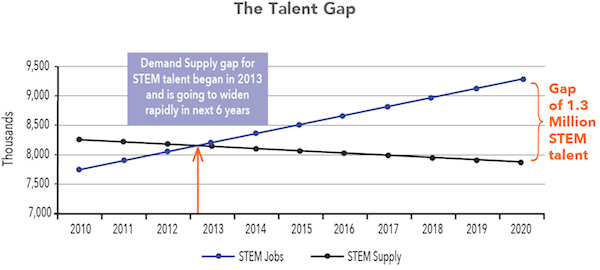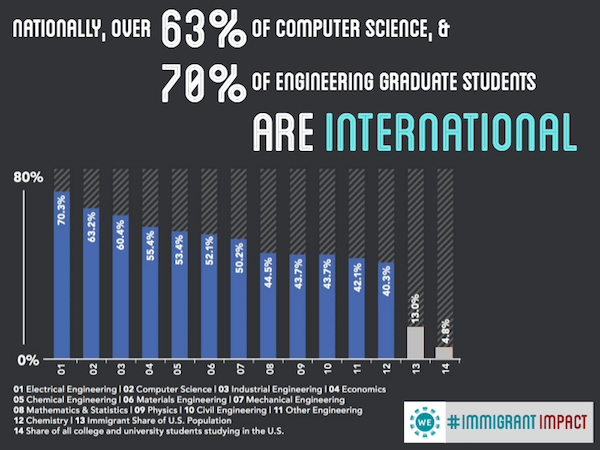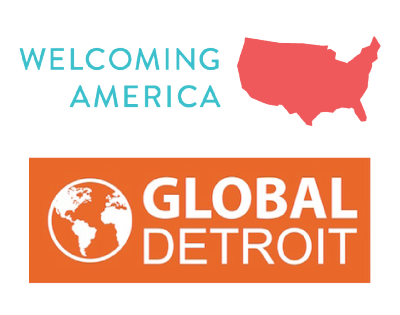International Students Are U.S. Business’ Best Hope For Growth
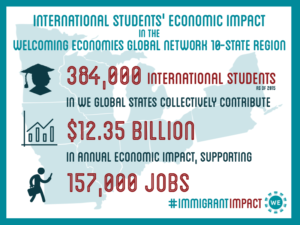 This week, as Donald Trump doubles down on anti-immigrant political rhetoric, hundreds of thousands of international students will say goodbye to the U.S. to return, degrees in hand, to their home countries. Far from being a drain on the American economy or threat to U.S. jobs, these talented graduates—disproportionately armed with graduate STEM degrees—could fill a very real need for companies that want to grow and create more jobs.
This week, as Donald Trump doubles down on anti-immigrant political rhetoric, hundreds of thousands of international students will say goodbye to the U.S. to return, degrees in hand, to their home countries. Far from being a drain on the American economy or threat to U.S. jobs, these talented graduates—disproportionately armed with graduate STEM degrees—could fill a very real need for companies that want to grow and create more jobs.
Ramsoft Systems, a Detroit-based information technology (IT) solutions firm with over 400 employees, is the archetype for America’s economic future. The company hires as many as 100 entry-level workers each year from local Michigan universities, seeking out highly-skilled IT, computer science, engineering, business, and other STEM graduates to retain its competitive edge serving clients like BMW, Hewlett Packard, Miller Brewing Company, and Northrop, among others.
Unfortunately, Ramsoft, like countless other American companies, struggles to find the talent it needs. Researchers estimate there will be an employment shortfall of 1.3 million unfilled STEM jobs by 2020.
International students studying in the U.S. represent the world’s most valuable economic asset—high-skilled STEM talent. According to the National Science Foundation between 40% and 70% of all graduate students in STEM fields at U.S. colleges and universities are international students. Over the past decade, the number of international students in the U.S. has grown 72% and now reaches over one million, comprising nearly 5% of all college and university students.
Working with a new cadre of immigrant economic development and immigrant welcoming nonprofit and government initiatives like Global Detroit, Ramsoft also looks to international students to help fill the unmet demand for STEM talent.
Michigan and other Midwestern states are leading the way in a growing trend of using international students to fill the talent gap, and international student retention programs in Detroit, St. Louis, and throughout Ohio are taking root. A report released this week by Global Detroit, the nonprofit economic development organization that I direct, chronicled an 80% growth over the past four years in the utilization of international students from seven key Michigan universities to fill unmet STEM talent needs.
When international students help a U.S. employer satisfy hard-to-fill STEM jobs, they allow those employers to better serve existing customers, expand their operations, and grow the business in ways that enable the employer to hire additional workers. The American Enterprise Institute and the Partnership for a New American Economy estimate that every international student who attains a graduate STEM degree in the U.S. who is hired by a U.S. employer creates 2.62 additional jobs in the U.S. economy.
“Education is an equalizer,” notes Ramsoft President and CEO Victor Naidu. While Ramsoft pursues talent wherever it can find it, Naidu believes that international students bring their own competitive advantage arguing that international students “have a high motivation and their willingness to work hard overcomes all their obstacles. Success is not an option for them. It’s a mandated requirement.”
Vivek Wadhwa and researchers at Duke University and University of California-Berkeley have documented that approximated 25% of all the high-tech firms in the U.S. (and over 50% of the high-tech firms being created in Silicon Valley) are created with at least immigrant founder or co-founder. Follow-up research suggests that the average high-tech immigrant entrepreneur starts their business 13 years after coming to the U.S. and the number one reason to come here was study as an international student.
While longer-term employment of this talent can face real challenges as America’s demand for high-skilled labor has made the federal H-1B program more difficult to use, international students who don’t stay beyond their OPT can help American firms develop a global footprint as these former employees return home and represent potential customers and suppliers for a firm using their labor.
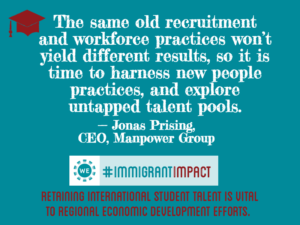 Economic developers, elected officials, and American businesses are beginning to realize the incredible economic potential that international students represent. New regulations will enable international students with STEM degrees to work for as long as 36 months after graduation in an Optional Practical Training (OPT) as part of their student visa (provided their U.S. employer uses the federal E-verify program).
Economic developers, elected officials, and American businesses are beginning to realize the incredible economic potential that international students represent. New regulations will enable international students with STEM degrees to work for as long as 36 months after graduation in an Optional Practical Training (OPT) as part of their student visa (provided their U.S. employer uses the federal E-verify program).
While federal immigration reform would provide a significant boost to the American economy and help U.S. companies to compete to hire the world’s best and brightest, there is a lot of innovation and progress underway. As Jonas Prising, CEO of Manpower Group has noted, “The same old recruitment and workforce practices won’t yield different results, so it is time to harness new people practices and explore untapped talent pools.”
Help spread the word!
Use these graphics to spread the word about the value of international students in our Rust Belt region, and visit us on Facebook and Twitter to share #ImmigrantImpact posts.
Steve Tobocman, a former State Representative and Michigan House Majority Floor Leader, is the Executive Director of Global Detroit and Co-Chair of the Welcoming Economies Global Network, a partnership of Global Detroit and Welcoming America.

